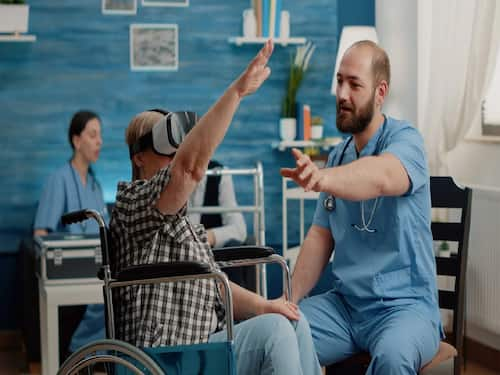
The digital evolution of healthcare has proven beneficial while tackling health crises like the Covid-19 pandemic, increasing the demand for tech health.
Digital influence and technological intervention are breaking barriers in the Indian healthcare industry, especially in post-pandemic times, leading to a dynamic transformation. While the telemedicine sector has witnessed a 30 percent spike in patients in India during the pandemic, the online consultation market is projected to grow at 72 percent CAGR to reach over 800 million dollars by FY2024, as per the report by Praxis Global Alliance. On the other hand, artificial intelligence is geared up to dominate the Indian healthcare industry by increasing the market value from 1.1 billion US dollars to 5 billion US dollars at a 39 percent CAGR. Tech trends like nanomedicine, virtual and augmented reality and Robo-assisted surgery are also acquiring large space in the Indian healthcare industry.
While adopting disruptive technologies, the Indian healthcare industry is evolving from improving accessibility and affordability to quality of life in rural areas, as well, through technological advancements. In India, the doctor-patient ratio is 1:1456 compared to the standard ratio of 1:1000 as per WHO. Since the doctor-patient ratio in India lacks the standard WHO ratio, digital healthcare becomes more imperative in remote rural areas where doctors can reach via technology. The digital evolution of healthcare has proven beneficial while tackling health crises like the Covid 19 pandemic, increasing the demand for tech health.
Let’s delve deep and understand the tech trends redefining the healthcare sector.
Tech Trends Redefining Healthcare
Artificial intelligence: AI is the key game changer in the global healthcare industry. Currently, the global market of AI stands at 15 billion US dollars and is estimated to expand at a CAGR of ~37 percent by 2030. The high-focus areas of AI in Indian healthcare are triaging, detection and diagnostics. AI plays a vital role in identifying the underlying causes of diseases and managing their treatment plans.
The government of India is also proactively boosting several initiatives, policies and schemes like National eHealth Authority (2015), the Biotechnology Ignition Grant Scheme (2012, Health Data Privacy & Security Act (2016) etc., promoting AI in healthcare. Artificial intelligence technology has profoundly changed India’s healthcare status from static to dynamic.
Virtual Healthcare (online consultation, telemedicine, etc): A few decades back, consulting doctors via video conference must have looked like a far-off dream. But technological advances have made it possible and turned reality into virtual reality, bringing in the future of the healthcare sector, ie, virtual healthcare. It has become the potential tech health segment in India and targeting to reach 5.4 billion US dollars at a CAGR of 31%. Why is virtual healthcare gaining popularity in the current times? Thanks to the pandemic. Tech advances have enabled doctor visits, nurse requirements or consultancy with any other specialist in the field of medicine, a much easier process by providing virtual platforms like video conferencing, mobile apps, messages etc.
Nanomedicine: It is another emerging tech-enabled trend that uses nanotechnology for highly-specific medical interventions for the diagnosis, treatment and prevention of diseases effectively. The global nanomedicine market size is expected to grow at a CAGR of 9.2 percent by 2030. Nanomedicines refer to a more diminutive and accurate delivery system that allows doctors to deliver chemotherapy directly to targeted tumors instead of poisoning an entire body. They slowly release medicine from a single nanoparticle, reducing the frequency of drug injections.
Robo-assisted surgery:Robotic surgeries are the new-edge technology enabling doctors and specialists to perform delicate procedures and complex surgeries more accurately. The surgical tools are comprised of a camera and mechanical arms, controlled by a surgeon through a computer system, giving them a high-definition (HD) and magnified view of the surgical site. The advantages of this most commonly used system include enhanced precision, flexibility and control, less pain and blood loss and quicker recovery. Since it is minimally invasive, it results in fewer scars and complications than conventional surgeries.
Virtual Reality in healthcare: Virtual reality caters to a broad spectrum of healthcare services. VR technology provides simulators that help healthcare professionals to practice surgeries and procedures in virtual reality, enhancing the quality of operations in real situations. It is also instrumental in physical and mental health treatments. While immersing in virtual worlds lowers pain and anxiety, it also helps tackle traumatic experiences by recreating the situation.
Conclusion
Technology is the future and the present of Indian healthcare. It facilitates real-time diagnosis, improves the chances of successful treatments, lowers healthcare costs and reduces hospital stays. The growing potential of technology in healthcare indicates that Indian health infrastructure will emerge well-fortified in the foreseeable future.
The article is contributed by Rajib Banerjee, Founder & CEO, MasMedi.
Total Wellness is now just a click away.
Follow us on
.